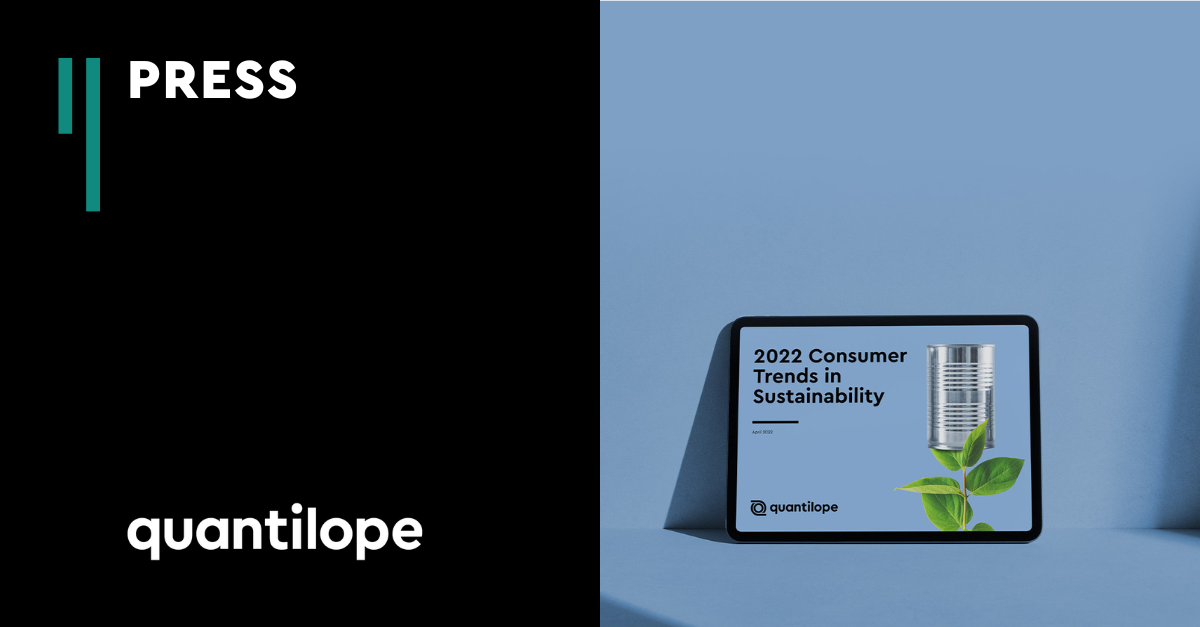April 20th, 2022: Rising inflation creates barrier for more sustainable food shopping in UK and Germany finds research from quantilope
- Price and taste drives most buying choices in the UK and Germany
- Money, or lack of with rising inflation, is a barrier to sustainable shopping for more than half of shoppers
- Around three quarters of shoppers actively attempt to reduce waste (77% in the UK and 71% in Germany) and more than half (51% in both countries) plan to buy less plastic.
- quantilope’s need-based segmentation identifies three new consumer segments for sustainable shoppers; Waste Warriors, Ingredient Inspectors and Broad Brushers
Nearly three quarters of British and German consumers strongly agree that protecting the environment is one of the most important issues of our times and, as a result, want to shop more sustainably. Half of consumers in each market check for sustainable ingredients on packaging and pay attention to the displays/information shown on shelves. However, with fast rising inflation and the worst cost of living crisis in a century, the decision about which food and drink brands to purchase is ultimately led by price for the majority (79%) of British shoppers. In Germany it’s all about taste (70%) and then price (69%).
In fact money, or lack of with rising inflation, is a barrier to adopting more sustainable shopping practices for more than half of shoppers in both countries, with just one in five in the UK and one in four in Germany making planet friendly choices that prioritise sustainable packaging. German shoppers are more likely to prioritise buying products with local ingredients; 39% compared to 19% in the UK.
These are the key findings of new research, 2022 Consumer Trends in Sustainability, launched today by quantilope, the research platform that automates advanced research methodologies. quantilope surveyed 1200 consumers in the UK and Germany to better understand changing attitudes towards sustainability; looking specifically at how it was influencing food choices and whether there were any barriers to more planet-friendly shopping behaviors.
Not a complete waste
David Attenborough’s Plastic Oceans film in 2016 painted a bleak picture about the damage plastic waste was having on the planet and it acted as a catalyst for change in British consumer attitudes, but not always behavior, particularly when faced with the price of making change.
quantilope’s survey finds that today most people want to actively reduce waste, and therefore their climate footprint, with one in three British shoppers saying they are more likely to buy products that have sustainable packaging (similar to German shoppers). German shoppers are more bothered about plastic though, with 58% of them identified in quantilope’s advanced segmentation as having a zero waste attitude.
Around three quarters of shoppers actively attempt to reduce waste (77% in the UK and 71% in Germany) and more than half (51% in both countries) plan to buy less plastic. Some plastic packaging is inevitable of course and one third of survey respondents claim to separate waste for recycling. In the UK and Germany, 34% are even willing to pay more taxes if they are used for environmental protection purposes; though 39% are not and 27% are neutral.
One third of shoppers (42% in Germany) are so concerned about plastic pollution that they do more than anyone else to reduce plastic in their purchases, separate waste and recycle the plastic they do sometimes have to buy. These Waste Warriors are strongly focused on factors that have a direct environmental impact such as reducing plastic in the ocean and biodegradability; they have a zero-waste attitude. As a collective, Waste Warriors are typically within the age bracket of 40 to 49 years. Compared to other segments quantilope identified in its study, they are more likely to be University educated, small city or sub-urban dwellers and earn a slightly higher income than average. They strongly believe that protecting the environment is one of the most important issues of our time.
Our research paints an interesting picture of how attitudes to sustainability impact food choices,” said Peter Aschmoneit, CEO and Co-Founder of quantilope. “While consumers expect brands to take responsibility for the sustainability of their products, they are more than willing to do their bit to save the planet. However there are barriers that need to be removed, or reduced, to make sustainable behaviors easier; money is the biggest barrier with uncertainty about what is sustainable and limited access to sustainable products also reducing sustainable actions.”
Sustainable ingredients for a healthier life - the Ingredient Inspectors
More than half of shoppers check the ingredients on the package (56% in the UK and 53% in Germany) and in store information and displays (53% in the UK and 49% in Germany).
One third are so rigorous about what’s in their purchases that they check for certifications on the package (33% in the UK and 39% in Germany) and look for direct sustainability claims (34% and 35% respectively). These Ingredient Inspectors are primarily focused on the content of the food that they buy and choose vegan and vegetarian products. They are more likely than other segments to buy local, believing that this can have a positive influence on the planet. While they are concerned about the planet, they are not avid recyclers, being more skewed to concerns about sustainability and health. They want to ensure that what they buy is healthy and sustainable - organic, natural and antibiotic and chemical free. Money isn’t a barrier, but time and effort is.
“There is broad acknowledgement that money, time and effort make being more sustainable a challenge,” continued Aschmoneit. “The two most popular actions that people currently take - reducing waste and using reusable shopping bags, require little time, effort and no specialist knowledge; demonstrating that when the action is easy to slot into everyday life, people are happy to take it. With rising inflation threatening disposable income, it is critical that manufacturers understand how changes they make to product pricing and packaging can impact consumer decisions.
Brands that will be best placed to win in the future, recognize that not all consumers are the same and have different attitudes around sustainability. They can’t use a one-size-fits all approach. They need to address the sustainability concerns of consumers, tailor their approach and communicate what they do clearly and without making them pay too much of a premium.”
Other research highlights:
- Confusion about what products are sustainable - British shoppers are slightly more confused about what products are sustainable (24%) than German shoppers (22%) - highlighting an opportunity for brands to make their sustainability messaging clearer
- Broad Brushers - around one third of the survey respondents in both countries surveyed dip in and out of the range of sustainability concerns and actions as it suits them. They are more likely to be swayed by price.
- Do no gooders - Only 1 in 10 people are not at all interested at all in sustainability, but this may be due to confusion about what being ‘sustainable’ means. .
- More German shoppers buy from specialist stores - 1 in 5 shoppers (25%) in the UK buy sustainable products from a specialist store compared to 37% of German shoppers, suggesting that there is perhaps room for retailers to expand their sustainable product ranges.




